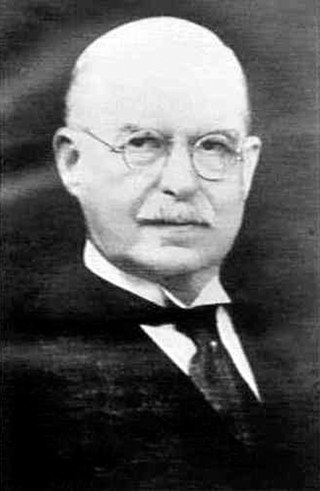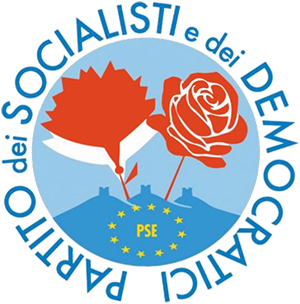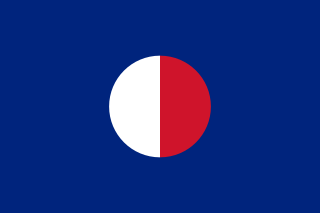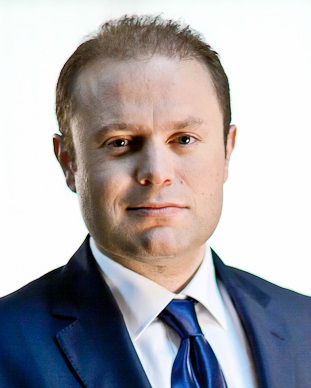
The Nationalist Party is one of the two major contemporary political parties in Malta, along with the Labour Party.

The Labour Party, formerly known as the Malta Labour Party, is one of the two major political parties in Malta, along with the Nationalist Party. It sits on the centre-left of the political spectrum.

Giorgio Borg Olivier, was a Maltese statesman and leading politician. He twice served as Prime Minister of Malta as the Leader of the Nationalist Party. He was also Leader of the Opposition between 1955–1958, and again between 1971–1977.

Gerald Paul Joseph Cajetan Carmel Antony Martin Strickland, 6th Count della Catena, 1st Baron Strickland, was a Maltese and British politician and peer, who served as Prime Minister of Malta, Governor of the Leeward Islands, Governor of Tasmania, Governor of Western Australia and Governor of New South Wales, in addition to sitting successively in the House of Commons and House of Lords in the Parliament of the United Kingdom.

Fortunato Mizzi was a Maltese lawyer and politician.

Enrico Mizzi was a Maltese politician, leader of the Maltese Nationalist Party from 1926 and briefly Prime Minister of Malta in 1950.

The Party of Socialists and Democrats is a social-democratic and democratic socialist political party in San Marino. It is a member of the Socialist International, and observer member of the Party of European Socialists. It is the only Sammarinese party with a reference to the European Union in its official political symbol. Its current-day Italian counterpart is the Democratic Party.

Sir Ugo Pasquale Mifsud was a Maltese politician, the 3rd Prime Minister of Malta under British home rule, and the first to serve a full term in power. He held office from 1924 to 1927 and from 1932 to 1933. He was a member of the Nationalist Party and the Maltese Italian community.

The Italian People's Party, also translated as Italian Popular Party, was a Christian-democratic political party in Italy inspired by Catholic social teaching. It was active in the 1920s, but fell apart because it was deeply split between the pro- and anti-fascist elements. Its platform called for an elective Senate, proportional representation, corporatism, agrarian reform, women's suffrage, political decentralisation, independence of the Catholic Church, and social legislation.

The Constitutional Party was a pro-British political party in Malta. It had representatives in the Maltese Legislative Assembly and Council of Government between 1921 and 1945, and again between 1950 and 1953, forming a government between 1927 and 1930 with the support of the Labour Party. A splinter group, the Progressive Constitutionalist Party was represented in Parliament between 1962 and 1966. The party was very much centred on the figure of its long-time leader Lord Strickland, with party supporters colloquially known in Maltese as "Stricklandjani".

The Italian Radical Party, also known as the Historical Radical Party, was a political party in Italy. Heir of the Historical Far Left and representative of Italy's political left in its beginning, with the rise of the Italian Socialist Party, it came to represent centre-left politics. The party was associated with classical radicalism, republicanism, secularism, social liberalism, and anti-clericalism.

Italian irredentism in Malta is the movement that uses an irredentist argument to propose the incorporation of the Maltese islands into Italy, with reference to past support in Malta for Italian territorial claims on the islands. Although Malta had formally ceased to be part of the Kingdom of Sicily only since 1814 following the Treaty of Paris, Italian irredentism in Malta was mainly significant during the Italian Fascist era.
The Maltese Political Union was a political party in Malta.

General elections were held in Malta on Saturday, 3 June 2017 to elect all members of the House of Representatives. The elections were contested by the Labour Party, led by Prime Minister Joseph Muscat, the Nationalist Party, led by opposition leader Simon Busuttil, and four other parties, making it the elections with most parties participating since 1962.

The Crown Colony of the Island of Malta and its Dependencies was the British colony in the Maltese islands, today the modern Republic of Malta. It was established when the Malta Protectorate was transformed into a British Crown colony in 1813, and this was confirmed by the Treaty of Paris in 1814.

The 2014 European Parliament election in Malta elected Malta's delegation to the European Parliament from 2014 to 2019. This was the third such election held in Malta. The elections were held on Saturday, 24 May 2014.

The Malta, sometimes also known as Gazzetta Maltese, was an Italian-language newspaper founded in 1883 in British Malta.

The Language Question was a linguistic and political controversy in the British colony of Malta which lasted from the early 19th to the mid-20th centuries. It began as a dispute over whether the dominant language on the islands should be English or Italian, and it ended with the native Maltese becoming an official language alongside English.
The Partito Popolare was a political party in the Crown Colony of Malta during the late 19th and early 20th centuries.
















